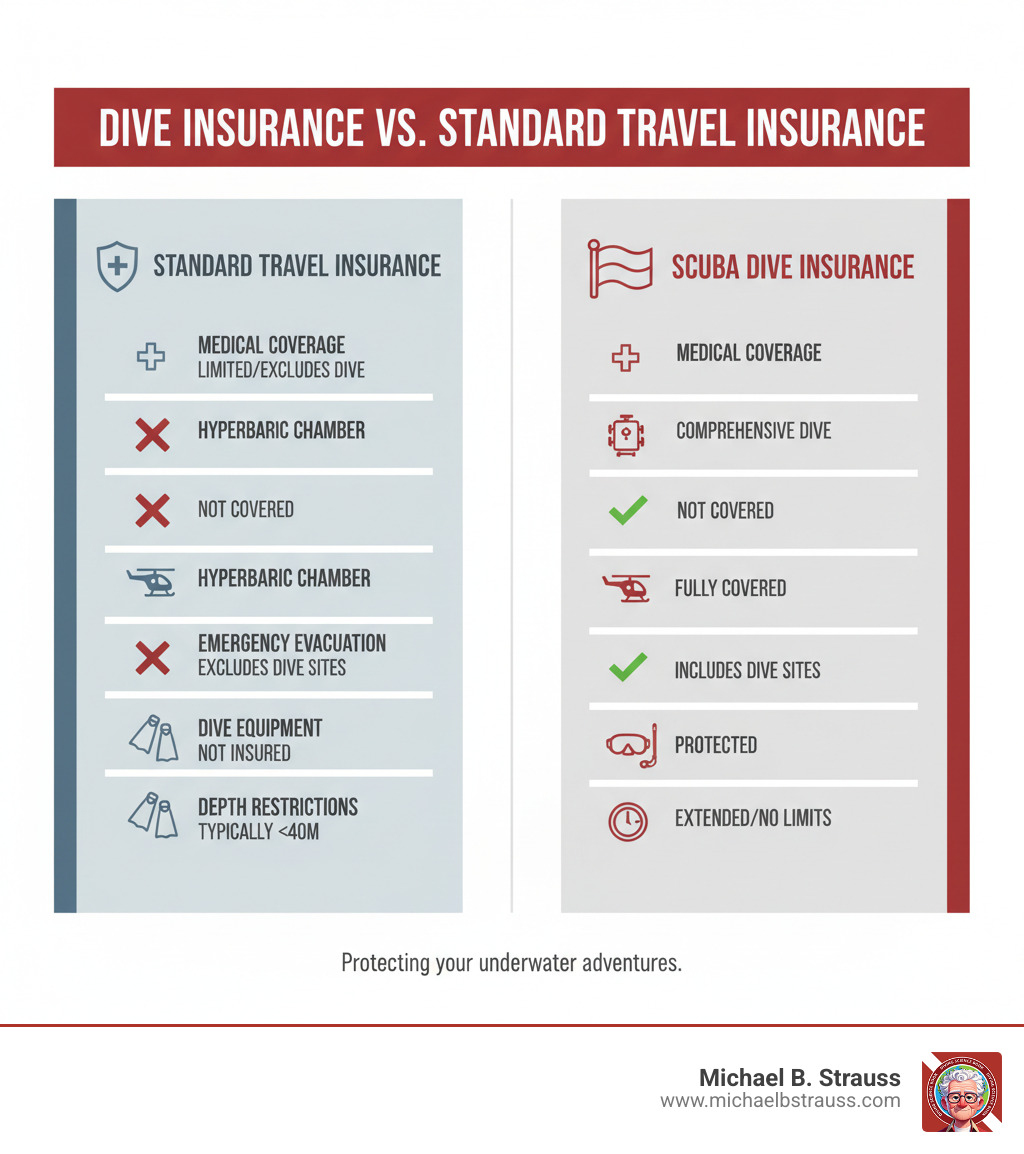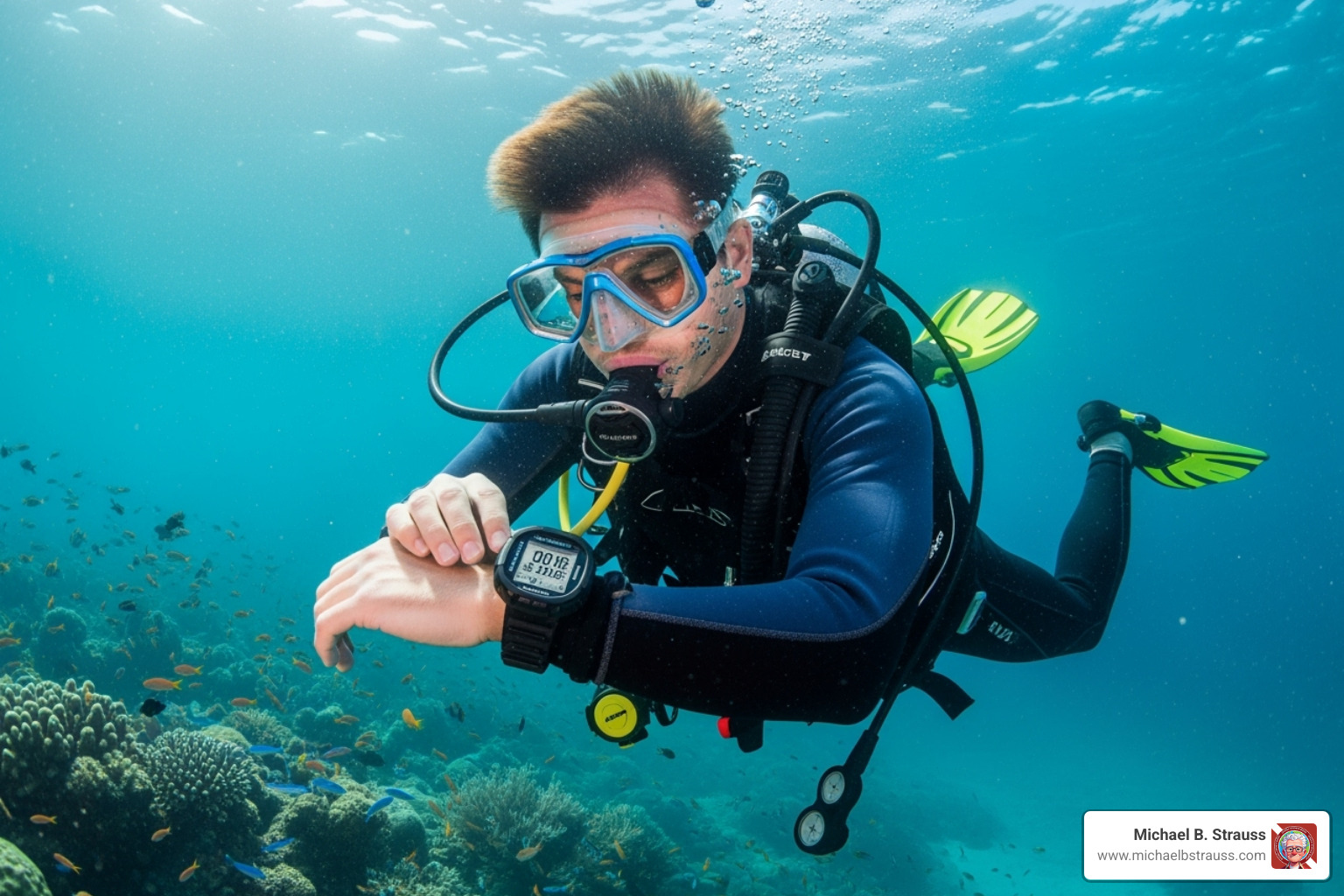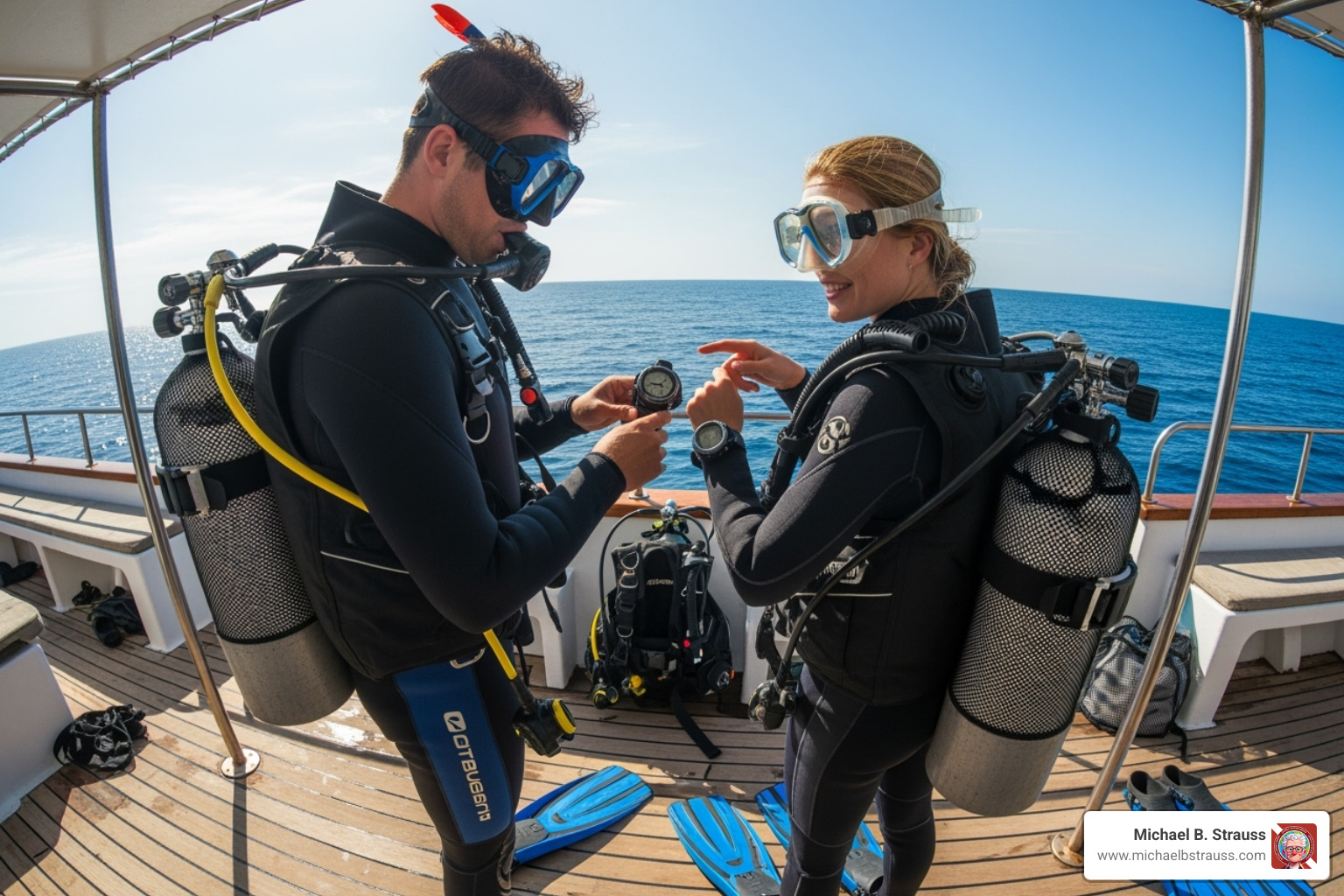Why Your Next Dive Trip Needs Insurance Protection
Scuba dive travel insurance is specialized coverage that protects divers from high medical costs and trip-related expenses that standard travel insurance often excludes. Here's what you need to know:
Key Coverage Areas:
- Medical emergencies including decompression sickness treatment
- Hyperbaric chamber therapy (can cost thousands per session)
- Emergency evacuation from remote dive locations
- Dive equipment replacement if lost or damaged
- Trip cancellation due to diving-related issues
Why Standard Insurance Falls Short:
- Most policies exclude "high-risk" activities like scuba diving
- Medical costs can reach tens of thousands for dive accidents
- Remote dive destinations lack adequate medical facilities
Starting a scuba diving adventure is a thrilling experience, offering a look at breathtaking coral reefs and fascinating marine life. But this adventure has risks that many divers overlook: diving accidents happen, and the costs can be overwhelming.
Emergency treatment for decompression sickness can cost thousands per day, while medical evacuation from a remote site can exceed $100,000. Your regular health insurance likely won't cover these diving-related expenses.
That's where scuba dive travel insurance is essential. Unlike standard policies that exclude diving, specialized insurance is designed for the unique risks divers face. Understanding your options can prevent a minor setback from becoming a financial disaster.

A Deep Dive into Scuba Dive Travel Insurance Coverage
Many divers mistakenly assume their regular health or travel insurance has them covered for a dive trip. Unfortunately, this often leads to surprise coverage gaps when an incident occurs underwater. Standard policies simply weren't designed for the unique risks of diving.
Dive Accident vs. Comprehensive Travel Insurance: What's the Difference?
Here's a breakdown of the key differences:
Dive accident insurance is highly specialized, focusing on medical expenses from diving injuries like decompression sickness or arterial gas embolism. This includes specialized care like hyperbaric chamber treatments, which can cost thousands per session. Since many remote dive destinations lack these facilities, emergency evacuation is often required.
Comprehensive travel insurance, in contrast, covers a wider range of travel mishaps like trip cancellations, lost luggage, and general medical emergencies. While some comprehensive policies include diving, they usually come with strict conditions, such as depth limits and certification requirements.
For complete protection, you often need both or a specialized scuba dive travel insurance policy that combines these elements. While your travel insurance might cover a broken bone from a slip on deck, it will likely exclude injuries sustained during the "high-risk" activity of scuba diving itself. The key is to ensure your policy explicitly covers diving-related medical treatment. For a deeper understanding of when and why these conditions occur, you can explore more info about why decompression sickness can occur.
Key Benefits to Look for in a Policy
Shopping for scuba dive travel insurance isn't just about finding the cheapest option—it's about finding the right safety net. Think of it as a reliable dive buddy for your travels. Here are the key benefits to look for:
- Emergency medical expenses: This should be your top priority, covering hospital stays, doctor's fees, and specialized treatment for conditions like decompression sickness. Costs can be substantial, so ensure your coverage limit is high.
- Medical evacuation and repatriation: This is crucial for remote diving. It covers the high cost of emergency transport, like an air ambulance, to a suitable medical facility. Repatriation ensures you can get home for treatment.
- Hyperbaric chamber treatment: This is non-negotiable for divers. Treatment for decompression sickness requires a hyperbaric chamber, and each session can cost thousands of dollars.
- Search and rescue: While you hope to never need it, this coverage handles the incredible expense of search operations involving boats and helicopters if a diver goes missing.
- Trip cancellation and interruption: This protects your investment in expensive trips like liveaboards, reimbursing non-refundable costs if you have to cancel or cut your trip short for a covered reason.
- Lost or damaged dive gear: This covers your significant investment in equipment like regulators and dive computers if they are lost, stolen, or damaged.
- COVID-19 coverage: Now essential, this includes coverage for quarantine expenses, medical treatment, and trip disruptions due to the pandemic.
These benefits show why specialized scuba dive travel insurance is so different from standard coverage, designed specifically for the risks of underwater exploration.
Reading the Fine Print: Common Exclusions and Depth Limits
Skipping the fine print on a scuba dive travel insurance policy can lead to expensive surprises. Here are the common exclusions and limits to watch for:
- Depth Limits: Most policies cover recreational diving up to about 30 meters (100 feet). If you plan to go deeper, you'll need to upgrade or find a specialized policy.
- Certification Requirements: Insurers require you to hold a valid certification from an agency like PADI and dive within your training limits. Diving beyond your certification level will void your coverage.
- Technical Diving Exclusions: Activities like cave diving, wreck penetration, and rebreather diving usually require separate coverage. Commercial diving is also typically excluded.
- Solo Diving: This can be a gray area. Insurers expect you to follow standard safety practices, so it's best to clarify their policy on solo diving beforehand.
- Pre-existing Medical Conditions: Most policies exclude claims related to pre-existing conditions unless you declare them and they are accepted by the insurer. Honesty during your application is crucial.
- Geographic Exclusions: Your coverage might be void if you travel to a destination with a government travel advisory. Check U.S. Department of State travel alerts before you go.
Other common exclusions include injuries sustained while under the influence of alcohol or drugs, or due to negligence. The bottom line is to read your policy documents carefully and ask for clarification on anything that isn't clear.

How to Choose the Right Scuba Dive Travel Insurance Policy
Choosing the right scuba dive travel insurance is about matching coverage to your plans and budget.
Start by assessing your diving. How deep will you go, and what type of diving will you do? Ensure your plans align with your certification level, as diving beyond your training can invalidate your insurance.
Consider the cost factors. Premiums are affected by your age, destination, trip duration, and chosen coverage level. Higher medical limits and comprehensive trip protection increase the price.
Decide between single-trip versus annual plans.
- A single-trip policy is great for one dive vacation per year.
- An annual multi-trip policy is often more economical for frequent divers, though it may have limits on the length of each trip (e.g., 30 or 60 days).
Finally, read the policy documents thoroughly before buying. This is where you'll find all the details on what's covered and excluded. If anything is unclear, contact customer service. Understanding your policy completely ensures no surprises if you need to file a claim.
Best Practices for a Safe and Insured Dive Adventure
Having the right scuba dive travel insurance is just one piece of the puzzle. Diving safely and responsibly is paramount. Following established safety protocols protects you and ensures your insurance coverage remains valid.
Pre-Dive Safety Checklist
Before you take that giant stride, run through this pre-dive checklist:
- Medical Fitness: Be sure you're medically fit to dive. Get a doctor's clearance if you have any health concerns. For more on how diving affects the body, explore diving science.
- Gear Maintenance: Your equipment is your lifeline. Have it serviced regularly and perform a pre-dive inspection. Check O-rings, test your regulator and BCD, and verify your dive computer is working.
- Review the Dive Plan: Pay attention during briefings. Understand the dive site, conditions, maximum depth, bottom time, and emergency procedures. Ask questions.
- Know Your Limits: Dive within your certification and comfort level. It's always acceptable to sit out a dive that feels too challenging. Diving beyond your limits is dangerous and can void your insurance.
- Choose Reputable Dive Operators: Research operators before you book. Look for proper certifications, well-maintained equipment, and experienced staff who enforce safety rules.
- The Buddy Check: This tradition saves lives. Never rush or skip it. Check each other's gear, review hand signals, and discuss the dive plan.
- Understand Local Conditions: Ocean currents and marine life vary by location. Listen to local dive professionals—they know their waters best.

Final Thoughts on Scuba Dive Travel Insurance and How to Make a Claim
We've covered the essentials of scuba dive travel insurance, from its key benefits to common exclusions. The message is clear: proper insurance is vital for any serious diver to protect against the real risks of our sport.
Key Takeaways:
- Always choose coverage that explicitly includes dive-related medical emergencies, especially decompression sickness and hyperbaric chamber treatment.
- Understand your policy's depth limits and certification requirements.
- Never let insurance replace safe diving practices.
If you need to make a claim, here’s how to handle the process:
In an emergency, prioritize getting medical help. Then, contact your insurance provider's 24/7 emergency hotline as soon as possible. They can help coordinate care and may arrange direct billing.
Documentation is crucial. Keep detailed records of everything: medical reports, receipts for all expenses, and police reports for lost or stolen gear. The more complete your documentation, the smoother the claim.
Understand the claims process. Some policies pay directly for major expenses, while others require you to pay upfront and seek reimbursement. Your insurer's assistance team can clarify the steps.
Submit claims promptly. Most policies have time limits for filing, so submit your claim with all required documentation as soon as you can.
The goal of scuba dive travel insurance is to provide peace of mind. By combining proper coverage with safe diving and continuous education, you create the best foundation for incredible underwater experiences.
Dive within your limits, maintain your gear, and never stop learning. The ocean will reward prepared divers with experiences beyond imagination.

To deepen your understanding of the science behind safe diving, get your copy of Diving Science Revisited here: https://www.bestpub.com/view-all-products/product/diving-science-revisited/category_pathway-48.html
DISCLAIMER: Articles are for "EDUCATIONAL PURPOSES ONLY", not to be considered advice or recommendations.







